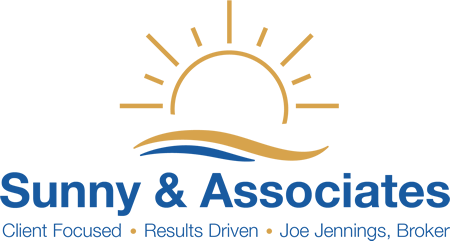
Published: April 3 2022 | | By Joe Jennings, Broker, ABR, PPM, CAM
Every industry has its share of jargon and acronyms, and real estate is certainly no exception.
Like many first-time real estate investors, you’ve probably been browsing forums, checking out articles, downloading podcasts, and spending research time on the internet. What may seem like a lot of industry jargon and endless acronyms, can be intimidating to property investing newbies, so Sunny & Associates is breaking down some common real estate investment terms in a reader-friendly glossary.
Capitalization Rate (Cap Rate)
Capitalization rate, or cap rate for short, is used to measure the annual rate of return on a real estate investment based on the profit that property is expected to generate. In simple terms, it’s the ratio between the net operating income (NOI) and purchase price. Cap rate is calculated by dividing net operating income (NOI) in the first year by the property purchase price. (NOI excludes loan costs if you used financing).
Example: Say you purchase a property for $150,000. The expected NOI in the first year is $12,000.
$12,000/$150,000 = 0.08
Cap rate: 8%
Note: Cap rate is one piece of the puzzle to include when evaluating an investment property. Lower-yielding properties tend to be safer investments, while higher-yielding homes typically come with a little more risk. At Sunny & Associates our client’s cap rates vary. In general, cap rates for an average investor with Sunny & Associates are between 3% to 12% Please reach out to Sunny & Associates for what cap rate would be best for you.
Net Operating Income (NOI)
Operating income (NOI) is a measure of a real estate investment property’s potential profitability. It’s calculated by estimating the property’s revenue and subtracting all operating expenses such as repairs, maintenance, property taxes, HOA fees, etc. NOI does not include mortgage payments.
Note: NOI allows you to analyze properties of all different types without looking at financing terms. NOI is also required to calculate cap rate.
Revenue – all reasonably necessary operating expenses = NOI
Cash Flow
Cash flow is the amount of money you can pocket at the end of each month, after all operating expenses (including loan payments) have been paid.
Rental income – all operating expenses (including loan payments) = Cash flow
Note: Ideally, an investment property should be cash-flow positive.
Cash-on-Cash Return
This figure is the ratio of annual pre-tax cash flow to the total amount of cash invested, expressed as a percentage. Cash-on-cash return measures the yearly return in relation to how much money you put down. Cash-on-cash return only measures the return on the actual cash invested. It’s the cash you’ve got left after one year, divided by the cash you’ve invested.
Annual pre-tax cash flow / actual cash invested = Cash-on-cash return
Note: Cash-on-cash return is one way to analyze an investment by focusing on returns based on the actual cash invested. It also helps you understand the effects of leverage.
Capital Expenditures (CapEx)
CapEx, or Capital Expenditures, are defined as new purchases or major improvements/renovations that extend the life of a property, such as replacing a roof, adding an extension or finishing the basement. This term also covers equipment and supplies required to make these improvements. Generally these are one-time, major expenses. Think of it this way: Routinely re-painting your rental home after tenants move out is not a capital expenditure. Installing a new HAVC unit is.
Note: It’s important to know there will come a time where you have to pay $1,200 to replace a bathroom floor, or $4,500-$10,000 to replace the roof. Just remember—these repairs/improvements ultimately extend the overall life and value of your investment property. While major improvements and upgrades are recovered through depreciation, general fixes or maintenance that keep a rental home in good operating condition are classified as “repairs” and can be written off in a single tax year.
Gross Rental Yield
Definition: Gross rental yield is the total income generated by a property, divided by the price paid for the property and associated closing costs. This is what you get before deducting operating costs (maintenance, property management, insurance, HOA fees, etc).
Note: Gross rental yield provides investors with a quick reference for an annualized return on an investment.
Monthly rent x 12 / purchase price and associated closing costs = Gross yield
Appreciation
Appreciation is an increase in the value of an asset over time. The increase can occur for a number of reasons, including increased demand or weakening supply, or as a result inflation or interest rate fluctuations. This is the opposite of depreciation, which is a decrease in the value of an asset over time.
Note: Like a property’s cap rate, appreciation is an important piece of the puzzle when evaluating the overall appeal of an investment property. As the market value of your rental increases, so does ROI.
Equity
Equity is the market value of a property less any debt against it. This value can build up over time as the mortgage balance declines and the market value of the property appreciates.
Note: Building home equity is a great strategy for building long-term wealth.
Turnkey Property
A turnkey property is a home or apartment that is completely, or very close to move-in ready.
Note: Turnkey properties are appealing from an investment standpoint since investors can purchase a property and rent it out immediately without making any major repairs.
Loan to Value (LTV)
Loan-to-Value (LTV) is a percentage that measures the total debt or leverage on a property compared to the market value. In most cases, real estate investors will use a conservative LTV of no more than 75% to 80%. A property with an LTV greater than 80% can be described as being over leveraged, creating the risk of potential negative cash flow due to a larger mortgage payment.
Example: LTV = $75,000 loan / $100,000 market value = 75% LTV
Note: In general, the lower the LTV is the less risk there is of having negative cash flow from a rental property.
Rent to Own (RTO)
Rent to Own (RTO) combines a real estate lease agreement with a real estate purchase agreement. For example, under an RTO agreement a tenant might pay $1,200 per month, with $1,000 being treated as normal rental income by the landlord and $200 credited toward the purchase price of the house agreed to in the purchase agreement.
Note: An RTO can also be used as a gradual exit strategy for a property owner that wants to sell, but not right away. Until the property is purchased by the tenant, the investor benefits from having monthly cash flow that is higher than what the normal rent would be. Another term for RTO is Lease-to-Purchase. Regardless of what the transaction is called, it’s a good idea to have an independent third party such as an escrow company accept, record, and disburse the monthly payments of an RTO to help ensure that the flow of funds is properly tracked.
Gross Rent Multiplier (GRM)
Gross Rent Multiplier (GRM) is the ratio of the price of a rental property to its gross rental income before expenses. Another way of thinking about GRM is that the ratio represents how many years it would take for an investment to pay for itself based on the gross rental income received. Everything else being equal, the lower the GRM is the better the investment may be.
Example:
• Market value / Gross rental income = GRM
• $100,000 market value / $12,000 gross rental income = 8.33
Note: GRM is a quick way of ranking potential rental property investments before spending time on a deeper analysis. Unlike Cap Rate, which measures the rate of annual return based on net income (excluding mortgage expense),
Are you stunned by these terms?
I was when I started investing in Real Estate back in 1990. Don’t worry, in the course of time investing, with proper guidance, from someone like Sunny & Associates you will be comfortable with these terms and more.
For more information about “Building Wealth through Real Estate” reach out to Joe Jennings at Sunny & Associates. Joe & Sunny are “Client Focus, Results Driven”

Top Rated Real Estate Broker
Real Estate Markets:
Tallahassee, Treasure Coast, Jensen Beach, Stuart, Port St. Lucie and Vero Beach Florida.




